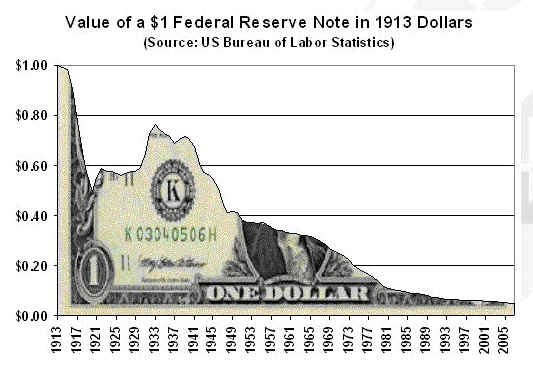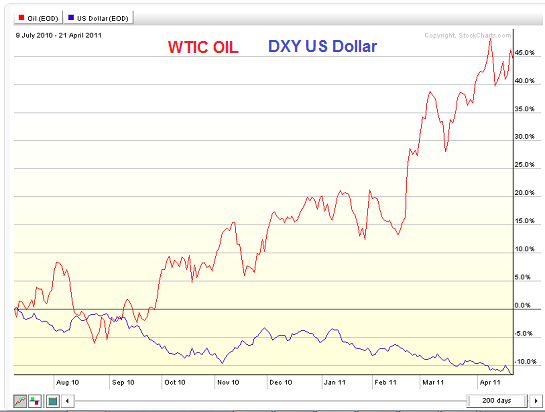So after yesterday the commodities market went into panic mode with OIL losing nearly 10 % in one go and SILVER continuing a sharp decline (-30% in 4 days), today we hear about the rising inflation from Bloomberg as well.
These are the early signs of what in few years could ruin the savings of each American family.
How long before you raise your domain prices when dealing with American buyers?
http://noir.bloomberg.com/apps/news?pid=20601109&sid=ahEOfkKdNVvY&pos=11
Restaurants Lift Prices as Inflation Hawks See Fed Lag Curve (1)
Share Business ExchangeTwitterFacebook| Email | Print | A A A
By Anna-Louise Jackson and Anthony Feld
May 6 (Bloomberg) -- Dining out will cost more this year as U.S. restaurants take advantage of the nearly two-year long expansion to boost prices on food and drinks.
Higher-priced menus reflect growing confidence by eateries that consumers can afford to pay more to eat out. Restaurants are emboldened in part by the success of U.S. airlines, which have raised fares almost 10 percent since a year ago, according to Dean Maki, chief U.S. economist at Barclays Capital in New York.
“The fact that the airline industry was able to pass along cost increases signals that the pricing environment has become somewhat more favorable than it was during the heart of the recession,” Maki said. “It’s more likely restaurants will be able to pass along price increases now relative to the last few years.”
Higher food and fuel costs are spurring menu changes, which are reflected in the food-services category of the personal- consumption-expenditures price index. Purchased meals and beverages, which make up about 6 percent of core PCE, rose nearly 2 percent in March from a year ago, the biggest increase since November 2009, according to data from the Bureau of Economic Analysis in Washington.
Several apparel companies -- including San Francisco-based Levi Strauss & Co., which supplies jeans to retailers in more than 110 countries -- also have announced increases to offset higher costs for cotton, foreign wages and freight. With imported-clothing prices rising at the fastest rate in at least a decade, retailers stand a better chance of exerting pricing power, Maki said.
Pressure on the Fed
All this puts pressure on the Federal Reserve to prevent inflation from getting out of hand, said Samer Nsouli, chief investment officer in New York for the Lyford Global Macro Fund.
“Inflation hawks see restaurants and airlines passing through higher prices and say the Fed’s behind the curve,” Nsouli said. “The Fed’s not paying enough attention to such trends when it comes to its continued accommodative monetary policy.”
The central bank’s Federal Open Market Committee said it “will pay close attention to the evolution of inflation” in the statement for its April 27 meeting, when it kept the target for the federal funds rate, or overnight inter-bank lending rate, at zero to 0.25 percent. It first set the rate at the record low in December 2008. The Fed also reaffirmed at the April meeting its plan to complete a $600 billion Treasury purchase program by June.
‘Transitory’ Threat
Fed Chairman Ben S. Bernanke and his chief deputies on the FOMC -- Fed Vice Chairman Janet Yellen and New York Fed President William C. Dudley -- have said in recent speeches that the committee’s leadership believes the threat from accelerating prices will prove “transitory.” Even so, policy makers have been bumping up their forecast for 2011 core inflation, which excludes food and fuel. The April projection is about 1.5 percent, compared with about 1.2 percent in January.
Restaurants have projected menu increases of 1.8 percent during the next six months, the most in a year, according to research by RBC Capital Markets. The amount depends on the type of food they serve, said Larry Miller, an RBC analyst in Atlanta. In the same period, the companies are forecasting a rise of at least 3.2 percent in their commodity costs, the research showed.
Rising Unemployment
The industry’s ability to pass along higher input costs depends on diners’ ability to pay more. The unemployment rate rose to 9 percent in April after dropping to 8.8 percent in March, still below a post-recession peak of 10.1 percent in October 2009. The Bloomberg Consumer Comfort Index fell to minus 46.2 in the week ended May 1, the second consecutive weekly decline.
Customer traffic still has improved from last year and “trends have been decent in terms of demand, so restaurants have a little more confidence to raise prices,” Miller said.
The Standard & Poor’s Supercomposite Restaurants Index, which includes McDonald’s Corp., The Cheesecake Factory Inc. and 25 other companies, has risen by 43 percent since December 31, 2007, while the S&P 500 Index has declined by 8 percent.
McDonald’s boosted menu prices in the U.S. by 1 percent in March, Chief Financial Officer Peter Bensen said on an April 21 conference call. The Oak Brook, Illinois-based fast-food chain had resisted such a move since 2009, said Miller, who upgraded McDonald’s stock in January to “outperform” from “sector perform.”
‘Inflationary Environment’
“Our upgrade was driven by the belief that fast-food models, like McDonald’s, thrive in a modest inflationary environment and that they would be able to successfully implement price increases in 2011,” Miller said.
BJ’s Restaurants Inc. expects to boost menu prices for the full year by about 3 percent to offset rising food and energy costs, Chief Executive Officer Gerald Deitchle said on an April 20 conference call. Like McDonald’s, the Huntington Beach, Calfornia-based company didn’t raise prices the past few years at its namesake brewery, pizza and grill chains, Deitchle said.
Cheesecake Factory, based in Calabasas Hills, California, is monitoring input costs after rolling out a 0.7 percent rise at its 150 casual-dining restaurants earlier this year, Chief Financial Officer Douglas Benn said on an April 20 conference call. The company currently projects a further boost of at least 1.4 percent later this year, he said.
“We will implement a higher level of menu-price increases in our upcoming summer menu change if commodity-cost pressures continue at the current level,” Benn said.
Food Quality
Cheesecake Factory, BJ’s and McDonald’s are among a group of “haves,” according to Steve West, an analyst at Stifel Nicolaus & Co. in St. Louis. These are restaurants that can push through moderate price changes, though they likely won’t be menu-wide, West said. He includes Chipotle Mexican Grill Inc. in this group because it has focused on improving food quality and the customer experience during the recession.
“If anyone has pricing power, it’s Chipotle,” said West, who maintains a “buy” rating on the stock.
The Denver-based burrito chain, which McDonald’s spun off in 2006, will wait to raise prices until the third quarter, allowing it time to “see the magnitude and timing of inflation and assess the customer reaction to price increases at other restaurants,” Chief Financial Officer John Hartung said on an April 20 conference call.
The restaurant industry will serve as a test of the retail sector’s pricing power, Maki said.
‘Stronger Position’
“Consumers are in a stronger position now because their labor income has been improving, but the surge in gasoline prices has moderated the recent growth in their purchasing power,” Maki said.
For Yum! Brands Inc. -- the Louisville, Kentucky-based owner of KFC, Pizza Hut and Taco Bell fast-food chains -- potential price changes in this environment are a balancing act, Chief Financial Officer Richard Carucci said on an April 21 conference call.
“When you have inflation and our sales are soft, you have to play it pretty smartly,” Carucci said.
To contact the reporters on this story: Anna-Louise Jackson in New York at
[email protected]; Anthony Feld in New York at
[email protected]
To contact the editor responsible for this story: Chris Wellisz at
[email protected]
Last Updated: May 6, 2011 11:06 EDT







